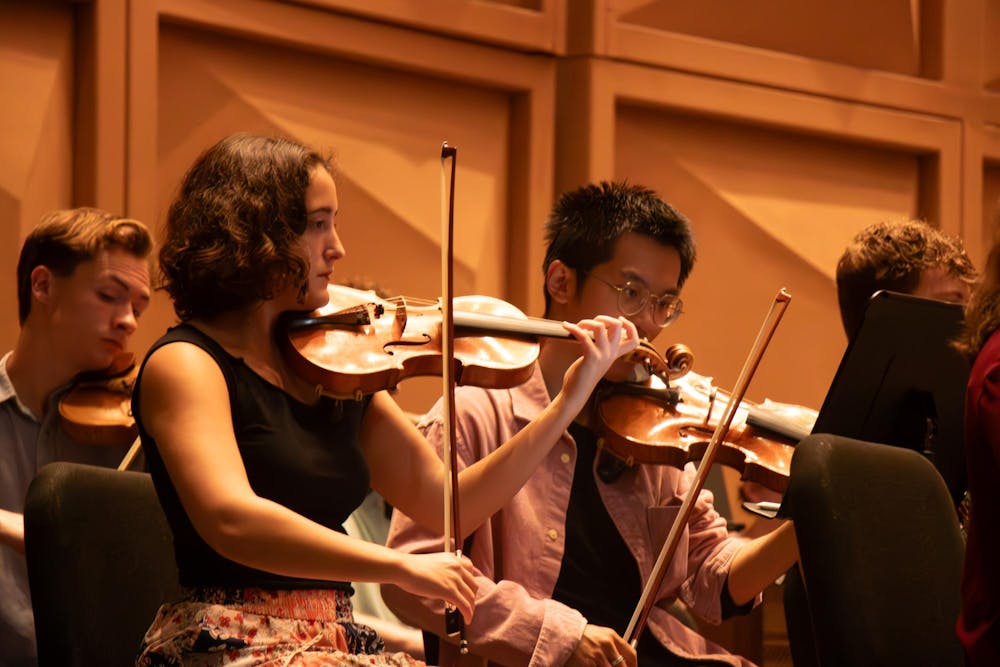The USC Symphony Orchestra has performed a variety of themes and pieces over the years, but their opening concert for the 2024-2025 season, "The Firebird & The Phoenix", holds a captivating surprise for listeners once again.
Celebrating the centennial anniversary of the School of Music, the Symphony Orchestra is dedicating the concert to its students, alumni and faculty. The first piece of concert is composed by USC faculty to honor this dedication, Scott Weiss, conductor of the Symphony Orchestra, said.
The performance features two pieces, both revolving around the theme of mythical birds. The pieces are "The Song of The Flaming Phoenix" by USC faculty composer Fang Man and Igor Stravinsky’s "The Firebird Suite", written in 1919.
The opening piece, "The Song of The Flaming Phoenix," was composed during the pandemic, a particularly emotional time for Man. While spending nearly two years writing the piece, her mother was in China suffering from an illness, and they were unable to meet due to travel restrictions, Man said. She said she dedicated the piece to her mother, who passed away while she was putting the final touches on the composition.
“My mother’s spirit was with me the whole time, helping me finish the piece,” Man said. “I felt like we were so far away, but she was there, just holding her breath for me."

As a result, "The Song of The Flaming Phoenix" is a heartfelt piece, Man said.
“It was really a struggle during that time,” she said. “A lot of this is reflected in the music. It's very dark and conveys much of the suffering and pain during that time. ”
The 30-minute composition is divided into four parts, drawing inspiration from another prominent 20th-century piece, Alexander Scriabin’s "Prometheus: The Poem of Fire". Man wrote the music to represent a variety of emotions, similar to the style and sound of Prometheus.
The second half of the piece incorporates both fictional and nonfictional birds. Man said she recorded several South Carolina native birds, such as the Carolina chickadee, Carolina wren and Northern cardinal from her own backyard. She then worked with a UC Berkeley professor to transcribe the bird songs into orchestral parts, writing music to replicate their unique sounds.
Man said she connected the South Carolina birds to Chinese mythical birds in her composition, based on their similar features. She explains that the Fenghuang, known as the phoenix, leads the other birds throughout the piece.
"I imagine that the Fenghuang led her feathered friends from heaven to save humanity from the ongoing disasters," Man said on her website.
The world’s oldest free-reed wind instrument with a history of over 3,000 years, the Sheng, is featured throughout the piece. Due to its challenging playability and rarity, there are only a few Sheng players in the world, Man said. Wu Wei, the soloist for "The Song of The Flaming Phoenix", is considered the best Sheng player globally, Man said.
“There probably aren't very many people alive who could play this piece, and the only person who has ever attempted it is this soloist, Wu Wei,” Weiss said.
The second and final piece, "The Firebird Suite," is one of the most famous works in classical music and serves as a grand finale for the concert, Weiss said.
“It’s a beautiful piece of color, melody and rhythm,” Weiss said. “It’s a really fun piece.”
The composition is "epic," brass-intensive and ominous, John Koontz, a second-year cellist in the Symphony Orchestra, said.
“It starts out very quietly, creating a mysterious atmosphere. Then it transitions into a more epic, grand sound, especially with the brass section playing,” Koontz said.
While it is sure to be an exciting performance, Weiss said it has been extremely difficult to get it ready.
"We've only had half a dozen rehearsals so far this year. And so to take on a piece this challenging and this early in the year is a heavy lift for us," Weiss said. "And so I would say that it's we've jumped into the deep end this season."
After performing these challenging pieces, Koontz said he will leave the stage relieved but extremely satisfied.
“It took a lot of time and effort and will make me feel very proud,” Koontz said. “I think even though it's out of my comfort zone and outside of my own personal taste, it's definitely worth the effort because it's a very unique experience.
The concert is on Sept. 26 and starts at 7:30 p.m. Students can attend for free with their Carolina ID.

